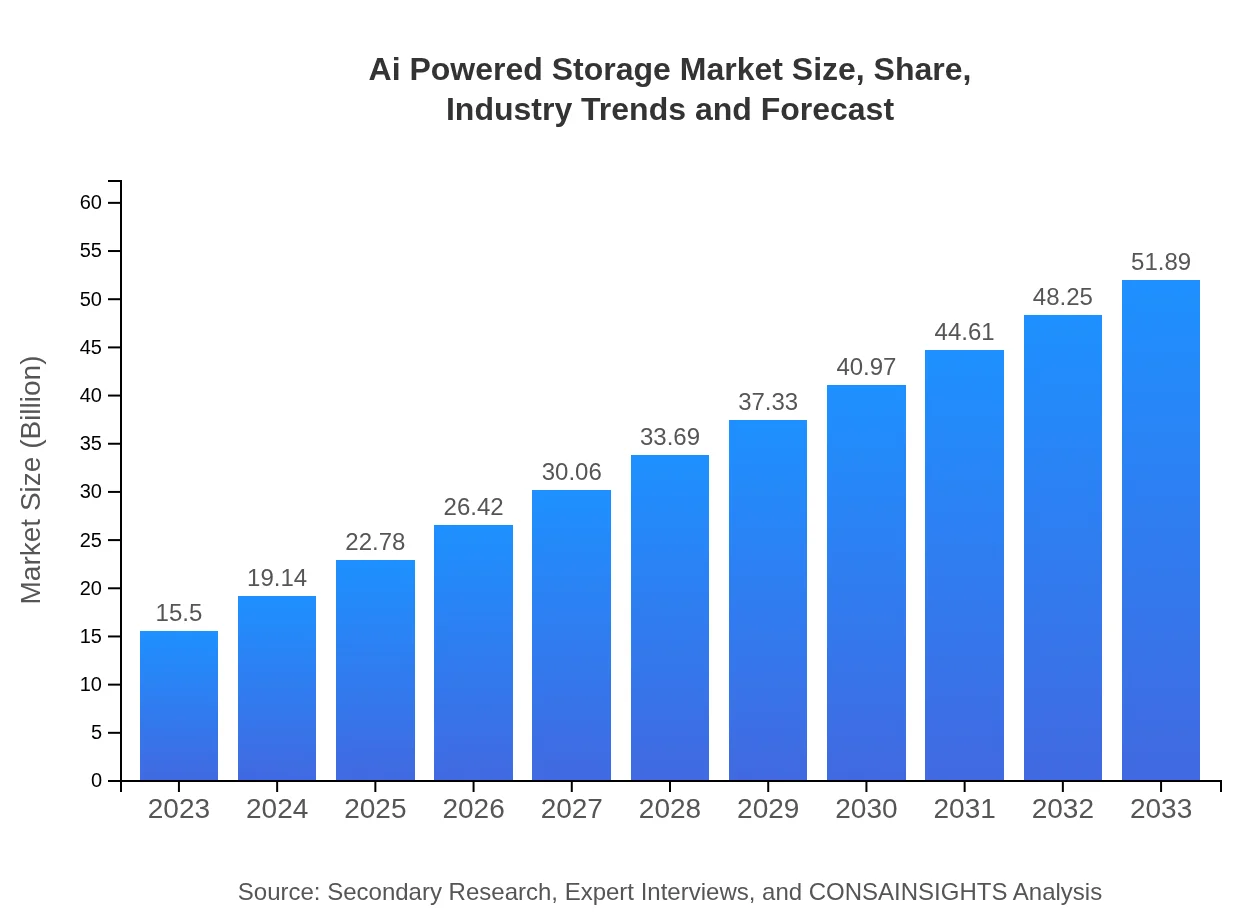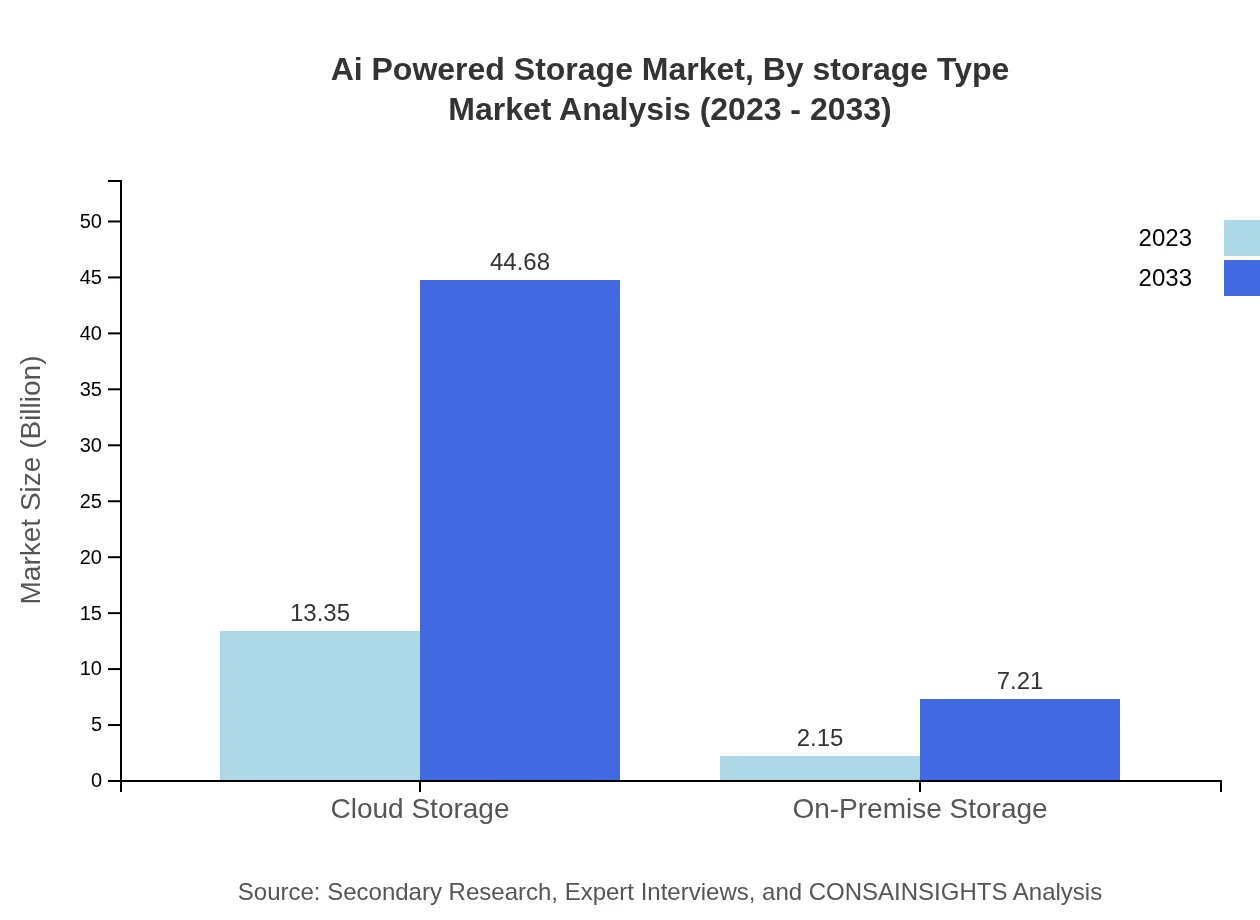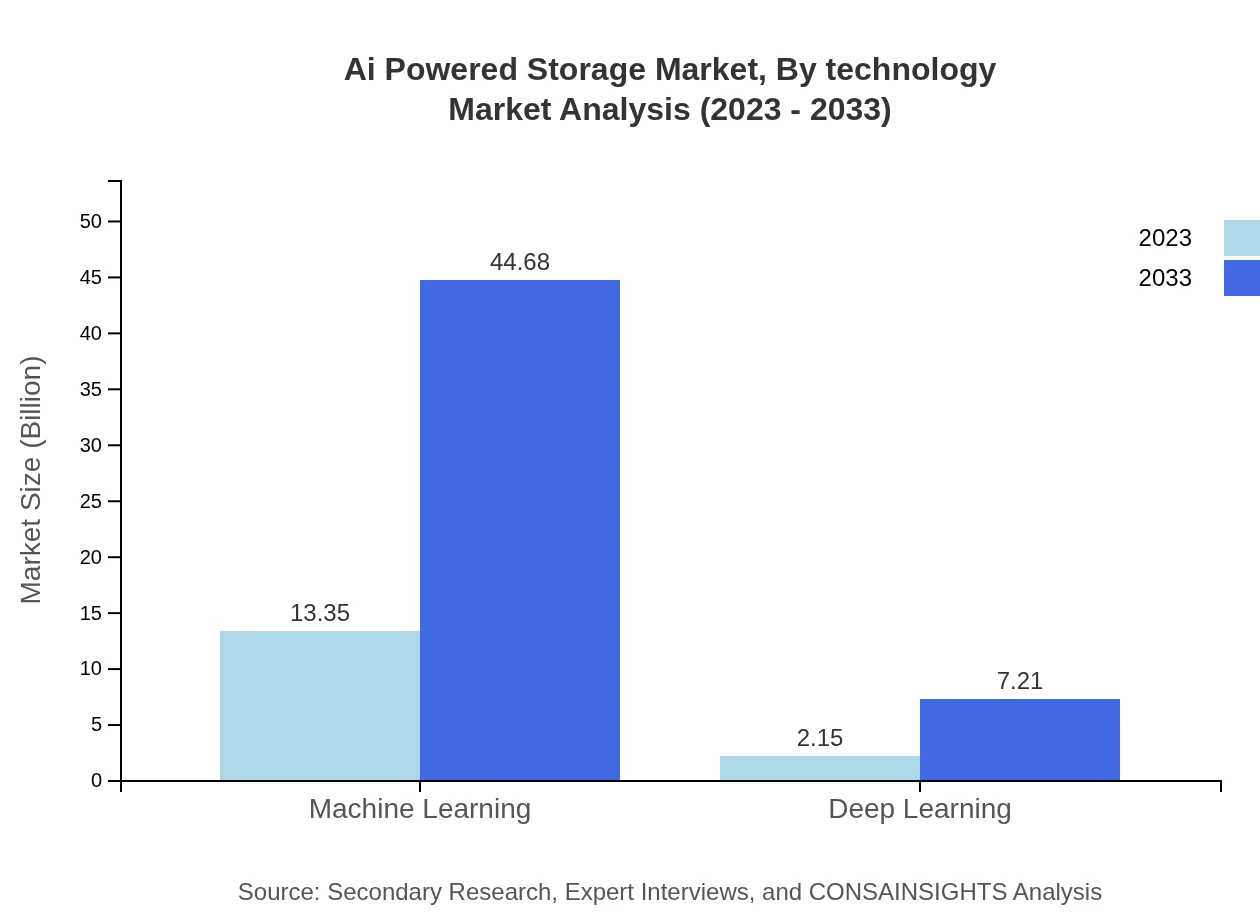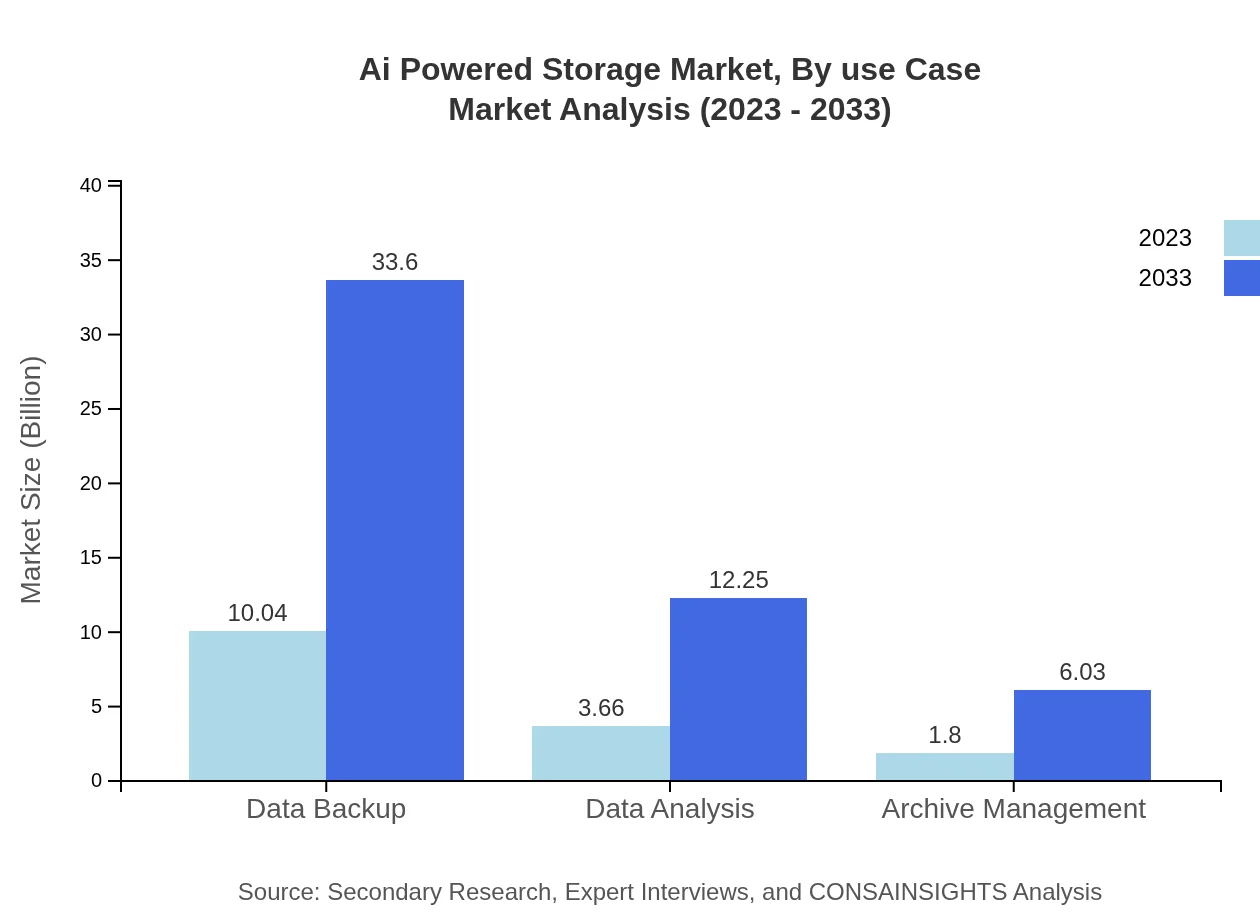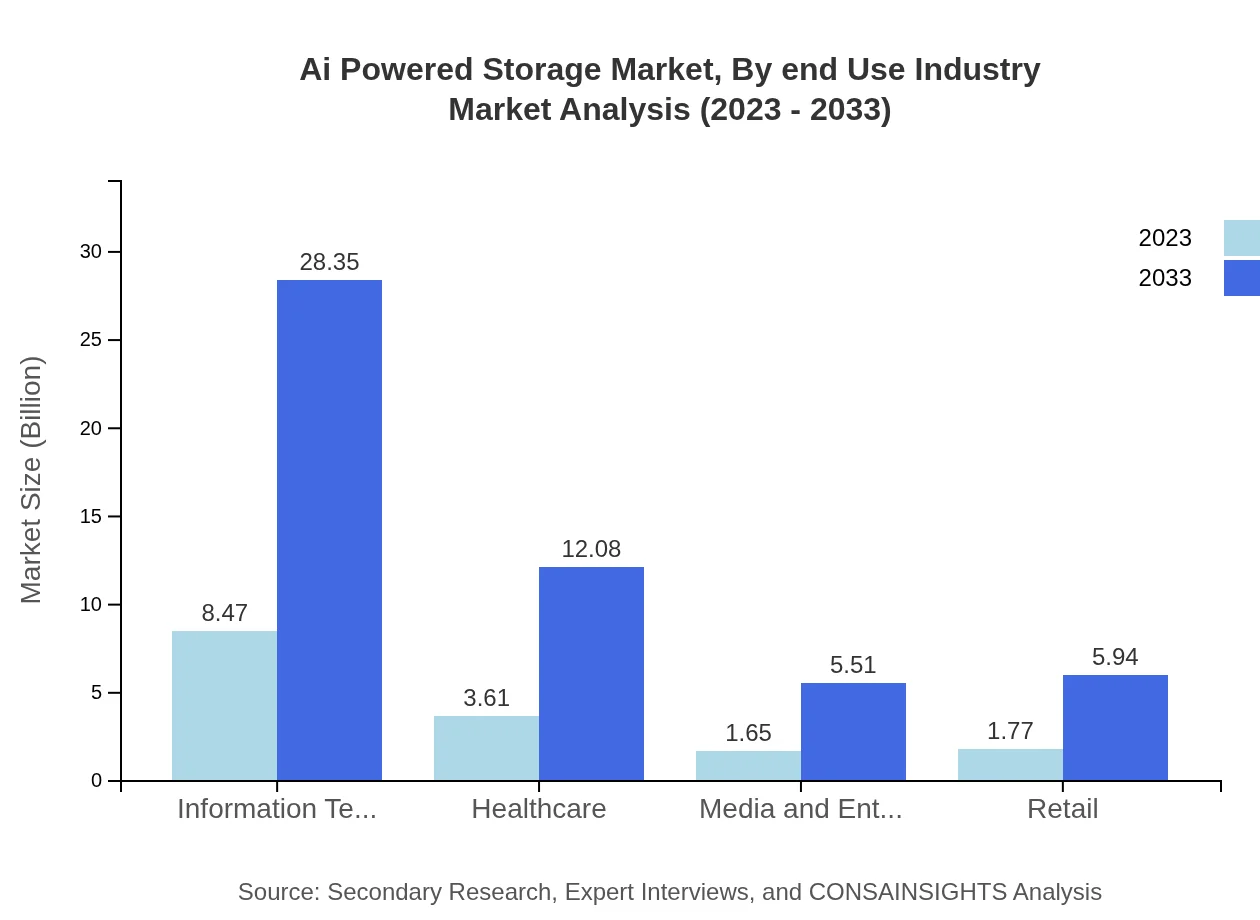Ai Powered Storage Market Report
Published Date: 31 January 2026 | Report Code: ai-powered-storage
Ai Powered Storage Market Size, Share, Industry Trends and Forecast to 2033
This report explores the AI Powered Storage market, detailing insights on market size, growth trends, segmentation, regional analysis, and future forecasts from 2023 to 2033.
| Metric | Value |
|---|---|
| Study Period | 2023 - 2033 |
| 2023 Market Size | $15.50 Billion |
| CAGR (2023-2033) | 12.3% |
| 2033 Market Size | $51.89 Billion |
| Top Companies | IBM, Dell Technologies, Amazon Web Services (AWS), Google Cloud, Microsoft Azure |
| Last Modified Date | 31 January 2026 |
AI Powered Storage Market Overview
Customize Ai Powered Storage Market Report market research report
- ✔ Get in-depth analysis of Ai Powered Storage market size, growth, and forecasts.
- ✔ Understand Ai Powered Storage's regional dynamics and industry-specific trends.
- ✔ Identify potential applications, end-user demand, and growth segments in Ai Powered Storage
What is the Market Size & CAGR of AI Powered Storage market in 2023?
AI Powered Storage Industry Analysis
AI Powered Storage Market Segmentation and Scope
Tell us your focus area and get a customized research report.
AI Powered Storage Market Analysis Report by Region
Europe Ai Powered Storage Market Report:
The European AI Powered Storage market is set to grow from $3.82 billion in 2023 to $12.78 billion by 2033. Government initiatives supporting AI adoption and a strong emphasis on data privacy regulations provide a conducive environment for market growth.Asia Pacific Ai Powered Storage Market Report:
In the Asia Pacific region, the AI Powered Storage market is projected to grow from $3.29 billion in 2023 to $11.03 billion by 2033. The growth is propelled by increasing data generation, rapid digitization, and technological advancements in AI.North America Ai Powered Storage Market Report:
North America remains the largest market, expected to rise from $5.83 billion in 2023 to $19.53 billion by 2033. The region is a leader in AI innovation, with significant investments in technology and cloud infrastructure.South America Ai Powered Storage Market Report:
The South American market will see an expansion from $1.20 billion in 2023 to $4.02 billion by 2033. The growing adoption of AI technologies among enterprises and rising internet penetration are key factors driving this growth.Middle East & Africa Ai Powered Storage Market Report:
In the Middle East and Africa, the market is anticipated to progress from $1.36 billion in 2023 to $4.54 billion by 2033. The increasing focus on digital transformation and the advent of AI-powered solutions are vital contributors to market expansion.Tell us your focus area and get a customized research report.
Ai Powered Storage Market Analysis By Storage Type
The analysis of the AI Powered Storage market by storage type reveals significant growth in data backup solutions, which are projected to rise from $10.04 billion in 2023 to $33.60 billion by 2033. Data analysis services also show strong expansion, anticipated to increase from $3.66 billion to $12.25 billion during the same period. With machine learning applications proving critical in optimizing storage and retrieval processes, this segment is expected to grow from $13.35 billion in 2023 to $44.68 billion by 2033. Similarly, cloud storage is anticipated to follow the same upward trend.
Ai Powered Storage Market Analysis By Technology
In terms of technology, machine learning remains dominant, representing 86.11% market share in 2023 which is consistent through to 2033. Technologies such as deep learning are also gaining traction, growing from a market size of $2.15 billion in 2023 to $7.21 billion in 2033. Other technologies, including cloud-based architectures, continue to be pivotal as businesses lean more toward remote and scalable storage solutions.
Ai Powered Storage Market Analysis By Use Case
Use cases such as data backup and archiving are significant in the AI Powered Storage market, reflecting growing trends toward efficient data management. The data backup segment is expected to capture a market share of 64.76% in 2023, remaining stable into 2033. Archive management is projected to grow significantly as businesses look to optimize long-term storage strategies.
Ai Powered Storage Market Analysis By End Use Industry
Key end-use industries include Information Technology, Healthcare, and Media & Entertainment. The IT segment leads with a market size of $8.47 billion in 2023, forecasted to reach $28.35 billion by 2033. Healthcare is also a substantial segment, expected to grow from $3.61 billion in 2023 to $12.08 billion, driven by increasing reliance on data-driven decision-making.
AI Powered Storage Market Trends and Future Forecast
Tell us your focus area and get a customized research report.
Global Market Leaders and Top Companies in AI Powered Storage Industry
IBM:
A leader in AI technology, IBM offers various AI-powered storage solutions that integrate machine learning for enhanced data management.Dell Technologies:
Dell provides cutting-edge AI-driven storage products ensuring scalability and performance, catering to data-intensive applications.Amazon Web Services (AWS):
AWS offers robust cloud storage options leveraging advanced AI capabilities for efficient data handling and analytics.Google Cloud:
Google Cloud’s AI-powered storage solutions provide businesses with innovative tools for managing large data sets effectively.Microsoft Azure:
Microsoft Azure enhances its cloud storage services with AI features that support business intelligence and data analytics.We're grateful to work with incredible clients.









FAQs
What is the market size of ai Powered Storage?
The global market size for AI-powered storage was valued at approximately $15.5 billion in 2023, with an expected Compound Annual Growth Rate (CAGR) of 12.3% from 2023 to 2033. This indicates a robust demand for advanced storage solutions.
What are the key market players or companies in the ai Powered Storage industry?
Key players in the AI-powered storage market include major tech companies and cloud service providers that specialize in data solutions, enhancing competitive dynamics while promoting innovation and comprehensive service offerings.
What are the primary factors driving the growth in the ai Powered Storage industry?
Growth drivers for the AI-powered storage market include increasing data generation across industries, the rising demand for efficient data management solutions, and enhancements in machine learning technologies, all contributing to the market's expansion.
Which region is the fastest Growing in the ai Powered Storage?
The North America region is the fastest-growing in the AI-powered storage sector, projecting from a market size of $5.83 billion in 2023 to $19.53 billion in 2033, reflecting significant investment in technology and innovation.
Does ConsaInsights provide customized market report data for the ai Powered Storage industry?
Yes, ConsaInsights offers customized market report data tailored to specific needs within the AI-powered storage industry, allowing businesses to gain insights that closely align with their strategic objectives.
What deliverables can I expect from this ai Powered Storage market research project?
Expect comprehensive reports detailing market analysis, segment data, competitive landscape, growth forecasts, and strategic recommendations tailored to the AI-powered storage sector.
What are the market trends of ai Powered Storage?
Current trends in the AI-powered storage market include increasing adoption of cloud storage solutions, a focus on enhanced data security, and the integration of advanced analytics, reshaping how businesses handle vast data volumes.

